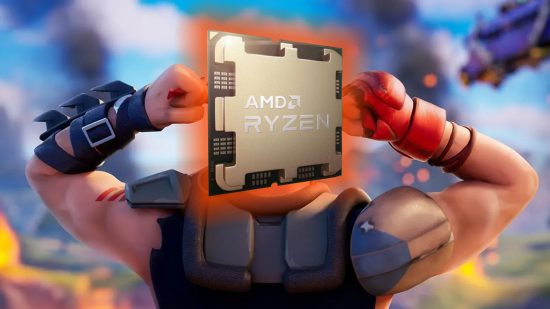AMD has just released its new Ryzen 8000G APUs – that’s a CPU with an extra large integrated GPU – and initial benchmarks show the flagship Ryzen 8700G offers stunning gaming performance without the need for a separate graphics card. Gamers can achieve generally between 50-120fps at 1080p with medium detail settings in many modern games.
When AMD announced the 8000G range, they claimed figures such as over 60fps in Cyberpunk 2077 with the 8700G. However, it’s only now that reviewers have got their hands on the chips we can definitively say that these new chips do actually deliver the sort of gaming performance AMD claimed. As such once we’ve reviewed them, there’s every chance they’ll be jumping straight onto our best gaming CPU list all while not needing you to save even more cash to pick out one of our best graphics cards.

The Ryzen 8700G is the highest-tier model of the new range, with the 8600G, 8500G, and 8300G rounding out AMD’s new offerings. The 8700G is an 8-core/16-thread chip, like the Ryzen 7 7700 or Ryzen 7 7800X3D. However, while those two chips feature very basic integrated GPUs that are only really good for basic video processing and the most simple of games, the 8700G has a far more powerful integrated GPU (iGPU).
The 8700G iGPU has 12 RDNA 3 compute units, which compares to just 2 RDNA 2 compute units for the 7700’s iGPU. The 8600G, meanwhile, has an 8CU GPU, and the 8500G and 8300G have much more modest 4CU GPUs.
For comparison, the $269 AMD Radeon RX 7600 graphics card has 32 RDNA 3 CUs, clearly making it a much more powerful graphics processor but that’s a lot of extra money that you don’t need to spend to still get decent performance. Moreover, that graphics card needs a power supply with an extra GPU power cable, you’ll need a larger case to fit it and potentially more cooling fans, and more. The 8700G, though, can be kept cool and quiet just with the simple cooler AMD supplies with the CPU – there’s no need to go searching for the best CPU cooler.
Diving deeper into those gaming benchmarks, we’ve picked our specific examples from the above video review by Hardware Unboxed. In their testing, they found that the chip will achieve 49fps average and 38fps 1% lows in Baldur’s Gate 3 (BG3) when running at 1080p with low detail settings.
Clearly, there are compromises here with having to drop to low detail settings but that’s still a very playable level of performance. Moreover, compared to the previous-gen AMD Ryzen 7 5700G (a class-leading chip for its integrated graphics), it’s a night and day difference – that chip gets just 20fps average and 11fps 1% minimum.
In less graphically-intensive games the picture is even more compelling. In Counter-Strike 2 (CS2) this APU will hit 119fps average and 70fps 1% minimum at 1080p with medium detail. Both figures ensure that while you won’t be competing in any tournaments with this chip, you’ll genuinely be able to compete in casual online play.
It’s a similar story in Fortnite, where this chip hits an astonishing 132fps with a 114fps 1% low all at 1080p with low graphics settings. Meanwhile, in most other game tests the chip seldom dropped below 40fps average. Plenty of other sites confirm these numbers too.
We’ve been enthusiastic about the abilities of top-tier integrated GPUs before but this is realistically the first time that huge numbers of gamers on a budget can confidently buy a system based on a CPU like this without any major flaws in performance. If you’re starting out with a cheap system and a 1080p monitor, this APU will provide all the speed you need.
The big caveat here is that the Ryzen 8700G price is $329, which is quite high compared to the cheapest of current-gen CPUs with more basic iGPUs. Add a cheap graphics card to your system and you can get significantly better performance than the 8700G for only $100-$200 more. It’s a shame AMD didn’t attach the same 780M iGPU of the 8700G to the 8600G or even the 8500G and price it closer to $200. At that level, these really would be stunning value entry-level gaming systems.
On the plus side, power consumption is very impressive with the 8700G consuming only around 150W under load, which most systems with a separate CPU and GPU will nearly double. Plus, if you want a very small PC nothing can compete with the performance of this chip in such a small space.
We’ll be getting in the 8700G and 8600G to run our own tests on them soon but in the mean time you can check out our best gaming CPU options for more on what other options are available in your price range.
